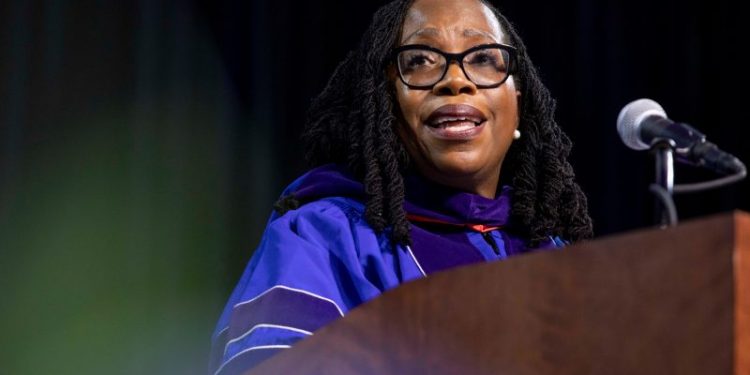In a scorching, 29-page dissent, Supreme Court Justice Ketanji Brown Jackson sharply criticized her conservative colleagues’ decision Thursday to reject affirmative action in college admissions decisions, overturning more than four decades of precedent.
“With let-them-eat-cake obliviousness, today, the majority pulls the ripcord and announces ‘colorblindness for all’ by legal fiat. But deeming race irrelevant in law does not make it so in life,” Jackson wrote in her dissenting opinion in Students for Fair Admissions v. University of North Carolina, one of two cases decided Thursday that centered on affirmative action.
Jackson recused herself from the other, Students for Fair Admissions v. President and Fellows of Harvard College, because of her ties to Harvard. Both cases were decided on ideological lines, with the court’s six conservative justices voting in the majority. But Jackson’s dissent received particular attention Thursday for its blistering paragraphs and for its sharp rebuttals from conservative Justice Clarence Thomas, the court’s other Black justice.
Jackson opened her dissent by noting the “gulf-sized race-based gaps” that continue to exist in American society — ones created “in the distant past” but passed down through generations. By restricting the use of race in admissions decisions, she said, the Supreme Court was detaching itself from the country’s actual past and present experiences.
She compared the majority members of the court to ostriches sticking their necks in the sand, a reference to a common myth about what the long-necked birds do when scared.
“No one benefits from ignorance. Although formal race-linked legal barriers are gone, race still matters to the lived experiences of all Americans in innumerable ways, and today’s ruling makes things worse, not better,” Jackson wrote. “The best that can be said of the majority’s perspective is that it proceeds (ostrichlike) from the hope that preventing consideration of race will end racism. But if that is its motivation, the majority proceeds in vain.”
Colleges being required to ignore race, she added, would not make the issue go away — and would in fact make race matter even more and prolong the problem of racism.
“It is no small irony that the judgment the majority hands down today will forestall the end of race-based disparities in this country, making the colorblind world the majority wistfully touts much more difficult to accomplish,” Jackson wrote.
As President Biden did in remarks from the White House after the Supreme Court issued its decisions Thursday, Jackson shot down in her dissent the idea that unqualified students were being admitted to colleges ahead of qualified students on the basis of race alone. She noted that applicants to UNC, for instance, were not required to submit demographic information, and that the school considered a wide range of information submitted by applicants, from academic performance to extracurriculars to background.
“The process is holistic, through and through,” Jackson wrote.
Jackson’s dissent also presented a hypothetical scenario she first raised in October during oral arguments for the case — when conservative justices had initially indicated their openness to ending the practice of using race as a factor in admissions. In it, Jackson spoke about two potential applicants to the University of North Carolina, both of whom had family ties to the state going back to before the Civil War.
One hypothetical applicant, “John,” was White and would be part of the seventh generation in his family to attend UNC. The other, “James,” was Black and would be the first generation in his family to attend the school, given that his ancestors were enslaved and did not have the opportunity to go to college. Without affirmative action, only John’s family background would be considered and valued by the institution, Jackson argued.
“These stories are not every student’s story. But they are many students’ stories,” Jackson wrote. “To demand that colleges ignore race in today’s admissions practices — and thus disregard the fact that racial disparities may have mattered for where some applicants find themselves today — is not only an affront to the dignity of those students for whom race matters. It also condemns our society to never escape the past that explains how and why race matters to the very concept of who ‘merits’ admission.”
Thomas, a longtime opponent of affirmative action who for decades was in the minority on the issue, took the unusual step of reading from his concurring opinion immediately after Chief Justice John G. Roberts Jr. read the majority’s decision.
In his concurring opinion, Thomas directly engaged with Jackson, the first Black woman to serve as a justice. In Jackson’s view, “almost all of life’s outcomes may be unhesitatingly ascribed to race,” Thomas wrote. He criticized her for ignoring the experiences of other groups that have faced barriers “while articulating her black and white world (literally).”
In one lengthy footnote in Jackson’s dissent, she responded to what she called Thomas’s “prolonged attack.”
“Justice Thomas ignites too many more straw men to list, or fully extinguish, here,” Jackson wrote. “The takeaway is that those who demand that no one think about race (a classic pink-elephant paradox) refuse to see, much less solve for, the elephant in the room — the race-linked disparities that continue to impede achievement of our great Nation’s full potential.”
Time would reveal the effects of the Supreme Court’s decision, Jackson concluded. Her final lament was that the conservative justices had cited the Equal Protection Clause of the Constitution to overturn affirmative action and “hamper” educational institutions on who to bring to their campuses to benefit every American.
“It would be deeply unfortunate if the Equal Protection Clause actually demanded this perverse, ahistorical, and counterproductive outcome,” she wrote. “To impose this result in that Clause’s name when it requires no such thing, and to thereby obstruct our collective progress toward the full realization of the Clause’s promise, is truly a tragedy for us all.”
Robert Barnes contributed to this report.














